BHS401A Professional Practice: Ethical and Legal Issues in Healthcare
VerifiedAdded on 2022/11/15
|11
|2287
|462
Report
AI Summary
This report examines the intricate landscape of ethical and legal challenges within healthcare practices. It begins by identifying potential ethical and legal issues, such as those related to patient safety, resource allocation, and practitioner burnout, and delves into the application of ethical standards like autonomy, beneficence, and justice. The report emphasizes the importance of legislation, professional codes of ethics, and practitioner responsibilities in mitigating risks and ensuring high-quality patient care. It further outlines the legal consequences of malpractice and negligence, highlighting the need for adherence to established standards of practice. The study proposes strategies for risk mitigation, including establishing robust ethical programs, fostering a culture of integrity, and regularly evaluating and revising ethical and compliance measures. The conclusion underscores the critical importance of ethical practice in healthcare and the need for healthcare organizations to provide frameworks for decision-making to enhance the well-being of patients and uphold public trust.
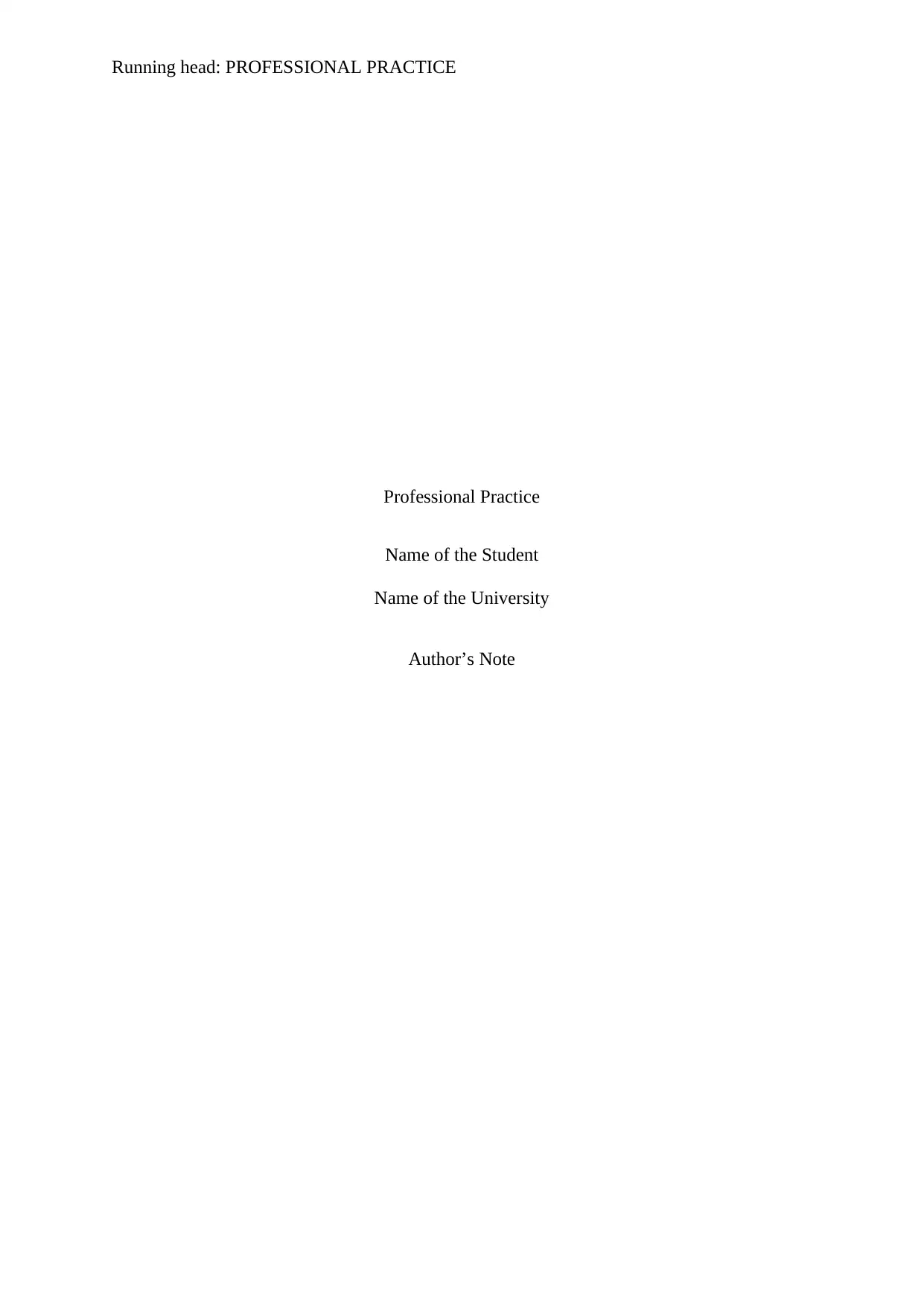
Running head: PROFESSIONAL PRACTICE
Professional Practice
Name of the Student
Name of the University
Author’s Note
Professional Practice
Name of the Student
Name of the University
Author’s Note
Paraphrase This Document
Need a fresh take? Get an instant paraphrase of this document with our AI Paraphraser
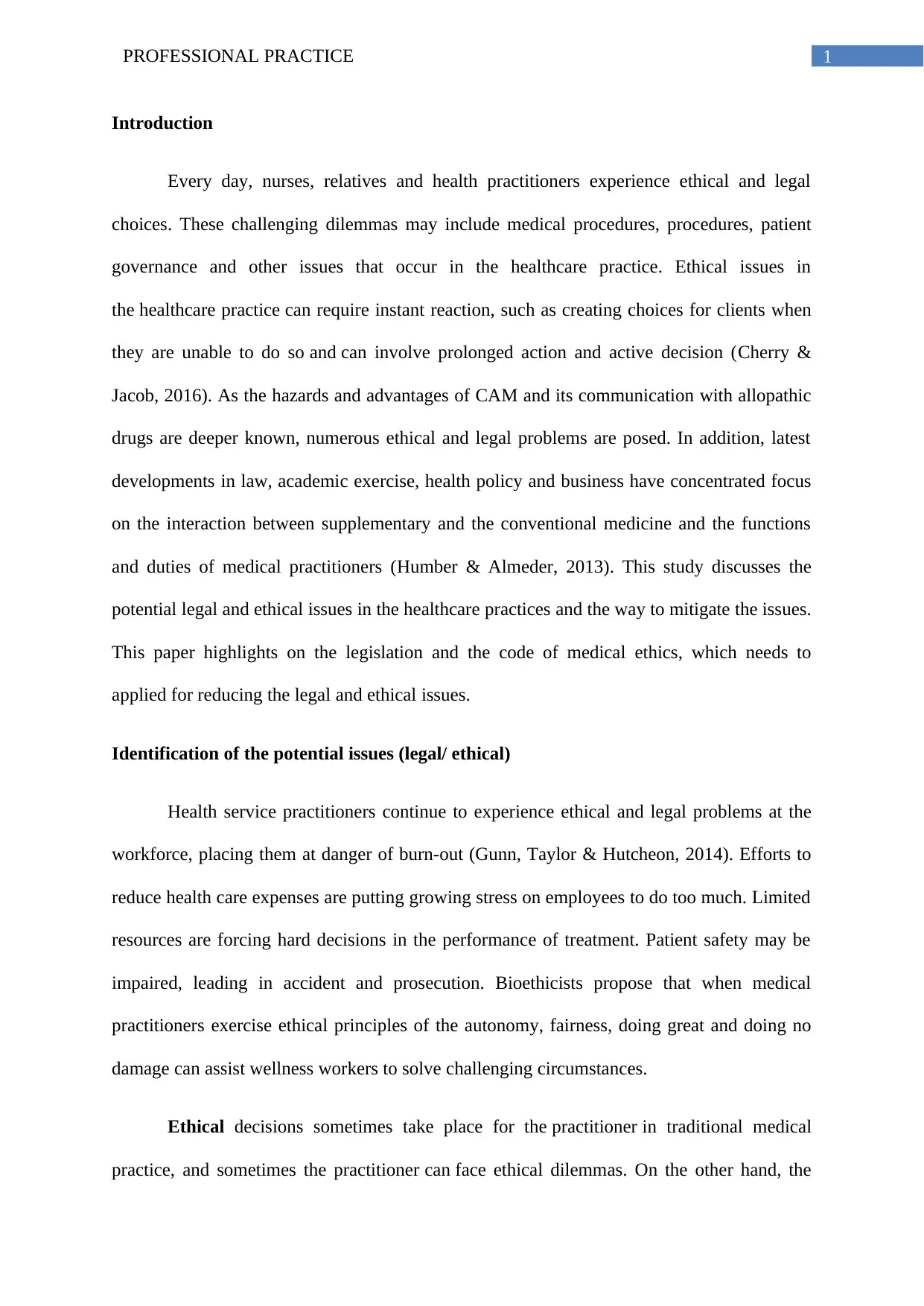
1PROFESSIONAL PRACTICE
Introduction
Every day, nurses, relatives and health practitioners experience ethical and legal
choices. These challenging dilemmas may include medical procedures, procedures, patient
governance and other issues that occur in the healthcare practice. Ethical issues in
the healthcare practice can require instant reaction, such as creating choices for clients when
they are unable to do so and can involve prolonged action and active decision (Cherry &
Jacob, 2016). As the hazards and advantages of CAM and its communication with allopathic
drugs are deeper known, numerous ethical and legal problems are posed. In addition, latest
developments in law, academic exercise, health policy and business have concentrated focus
on the interaction between supplementary and the conventional medicine and the functions
and duties of medical practitioners (Humber & Almeder, 2013). This study discusses the
potential legal and ethical issues in the healthcare practices and the way to mitigate the issues.
This paper highlights on the legislation and the code of medical ethics, which needs to
applied for reducing the legal and ethical issues.
Identification of the potential issues (legal/ ethical)
Health service practitioners continue to experience ethical and legal problems at the
workforce, placing them at danger of burn-out (Gunn, Taylor & Hutcheon, 2014). Efforts to
reduce health care expenses are putting growing stress on employees to do too much. Limited
resources are forcing hard decisions in the performance of treatment. Patient safety may be
impaired, leading in accident and prosecution. Bioethicists propose that when medical
practitioners exercise ethical principles of the autonomy, fairness, doing great and doing no
damage can assist wellness workers to solve challenging circumstances.
Ethical decisions sometimes take place for the practitioner in traditional medical
practice, and sometimes the practitioner can face ethical dilemmas. On the other hand, the
Introduction
Every day, nurses, relatives and health practitioners experience ethical and legal
choices. These challenging dilemmas may include medical procedures, procedures, patient
governance and other issues that occur in the healthcare practice. Ethical issues in
the healthcare practice can require instant reaction, such as creating choices for clients when
they are unable to do so and can involve prolonged action and active decision (Cherry &
Jacob, 2016). As the hazards and advantages of CAM and its communication with allopathic
drugs are deeper known, numerous ethical and legal problems are posed. In addition, latest
developments in law, academic exercise, health policy and business have concentrated focus
on the interaction between supplementary and the conventional medicine and the functions
and duties of medical practitioners (Humber & Almeder, 2013). This study discusses the
potential legal and ethical issues in the healthcare practices and the way to mitigate the issues.
This paper highlights on the legislation and the code of medical ethics, which needs to
applied for reducing the legal and ethical issues.
Identification of the potential issues (legal/ ethical)
Health service practitioners continue to experience ethical and legal problems at the
workforce, placing them at danger of burn-out (Gunn, Taylor & Hutcheon, 2014). Efforts to
reduce health care expenses are putting growing stress on employees to do too much. Limited
resources are forcing hard decisions in the performance of treatment. Patient safety may be
impaired, leading in accident and prosecution. Bioethicists propose that when medical
practitioners exercise ethical principles of the autonomy, fairness, doing great and doing no
damage can assist wellness workers to solve challenging circumstances.
Ethical decisions sometimes take place for the practitioner in traditional medical
practice, and sometimes the practitioner can face ethical dilemmas. On the other hand, the
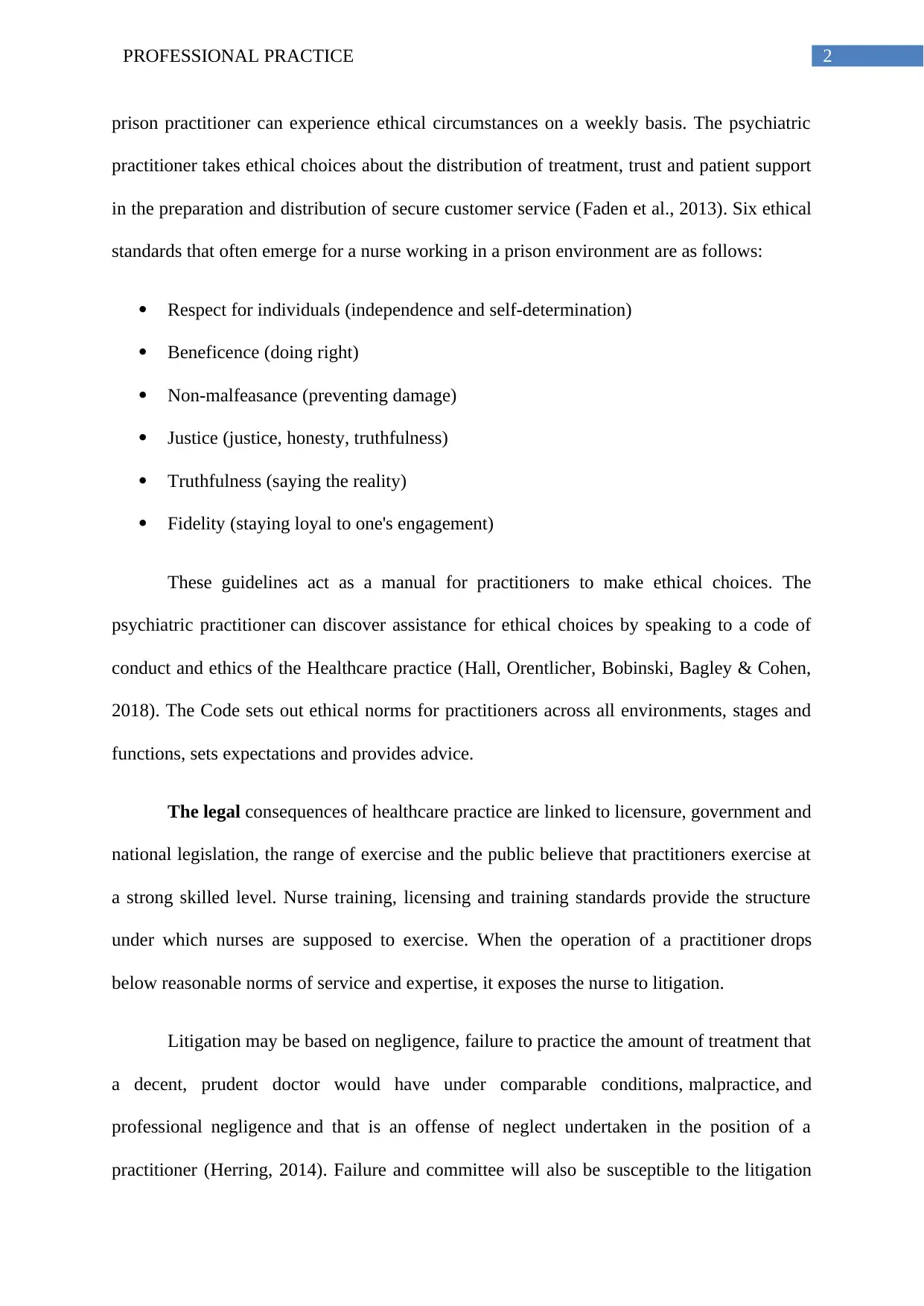
2PROFESSIONAL PRACTICE
prison practitioner can experience ethical circumstances on a weekly basis. The psychiatric
practitioner takes ethical choices about the distribution of treatment, trust and patient support
in the preparation and distribution of secure customer service (Faden et al., 2013). Six ethical
standards that often emerge for a nurse working in a prison environment are as follows:
Respect for individuals (independence and self-determination)
Beneficence (doing right)
Non-malfeasance (preventing damage)
Justice (justice, honesty, truthfulness)
Truthfulness (saying the reality)
Fidelity (staying loyal to one's engagement)
These guidelines act as a manual for practitioners to make ethical choices. The
psychiatric practitioner can discover assistance for ethical choices by speaking to a code of
conduct and ethics of the Healthcare practice (Hall, Orentlicher, Bobinski, Bagley & Cohen,
2018). The Code sets out ethical norms for practitioners across all environments, stages and
functions, sets expectations and provides advice.
The legal consequences of healthcare practice are linked to licensure, government and
national legislation, the range of exercise and the public believe that practitioners exercise at
a strong skilled level. Nurse training, licensing and training standards provide the structure
under which nurses are supposed to exercise. When the operation of a practitioner drops
below reasonable norms of service and expertise, it exposes the nurse to litigation.
Litigation may be based on negligence, failure to practice the amount of treatment that
a decent, prudent doctor would have under comparable conditions, malpractice, and
professional negligence and that is an offense of neglect undertaken in the position of a
practitioner (Herring, 2014). Failure and committee will also be susceptible to the litigation
prison practitioner can experience ethical circumstances on a weekly basis. The psychiatric
practitioner takes ethical choices about the distribution of treatment, trust and patient support
in the preparation and distribution of secure customer service (Faden et al., 2013). Six ethical
standards that often emerge for a nurse working in a prison environment are as follows:
Respect for individuals (independence and self-determination)
Beneficence (doing right)
Non-malfeasance (preventing damage)
Justice (justice, honesty, truthfulness)
Truthfulness (saying the reality)
Fidelity (staying loyal to one's engagement)
These guidelines act as a manual for practitioners to make ethical choices. The
psychiatric practitioner can discover assistance for ethical choices by speaking to a code of
conduct and ethics of the Healthcare practice (Hall, Orentlicher, Bobinski, Bagley & Cohen,
2018). The Code sets out ethical norms for practitioners across all environments, stages and
functions, sets expectations and provides advice.
The legal consequences of healthcare practice are linked to licensure, government and
national legislation, the range of exercise and the public believe that practitioners exercise at
a strong skilled level. Nurse training, licensing and training standards provide the structure
under which nurses are supposed to exercise. When the operation of a practitioner drops
below reasonable norms of service and expertise, it exposes the nurse to litigation.
Litigation may be based on negligence, failure to practice the amount of treatment that
a decent, prudent doctor would have under comparable conditions, malpractice, and
professional negligence and that is an offense of neglect undertaken in the position of a
practitioner (Herring, 2014). Failure and committee will also be susceptible to the litigation
⊘ This is a preview!⊘
Do you want full access?
Subscribe today to unlock all pages.

Trusted by 1+ million students worldwide
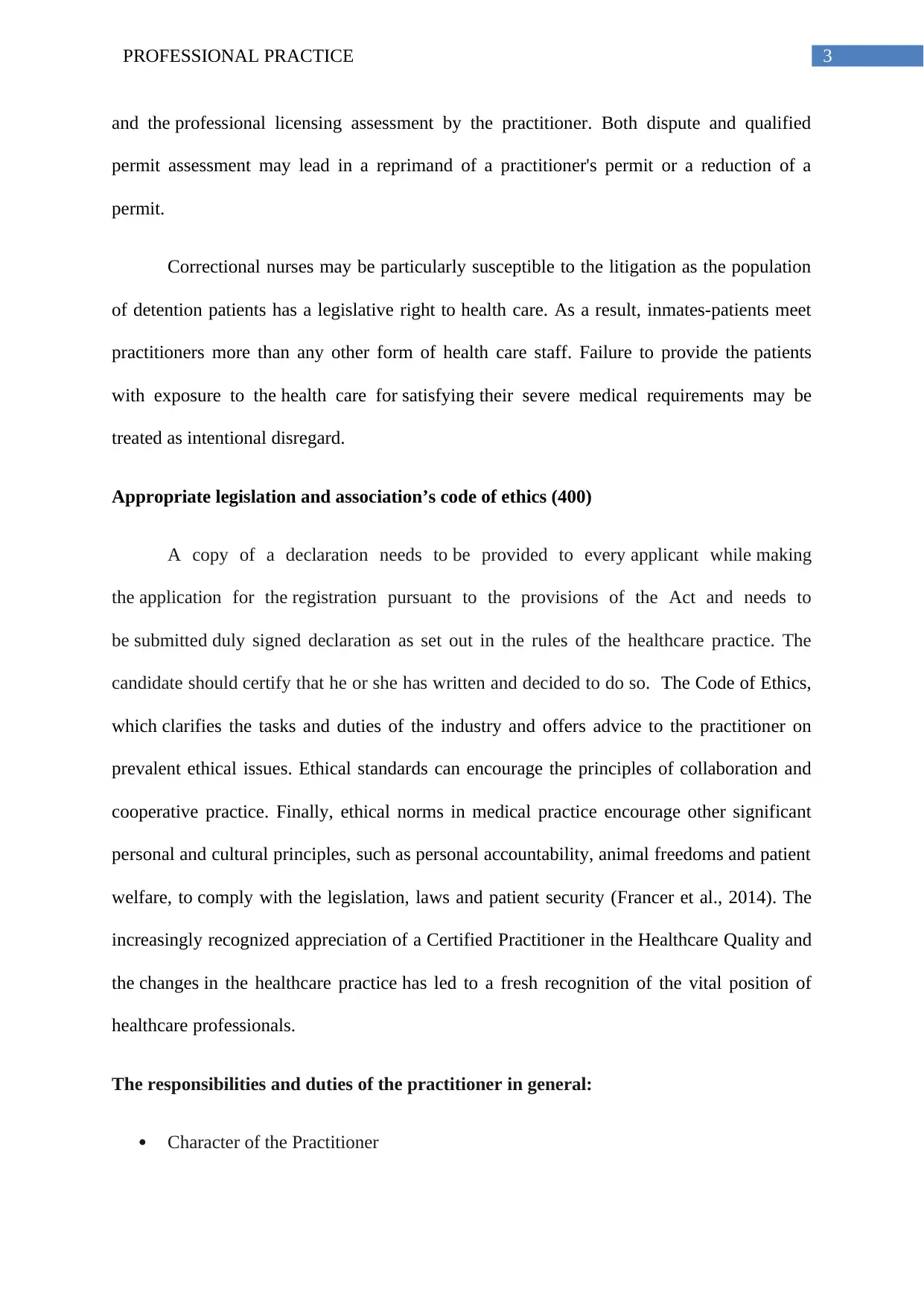
3PROFESSIONAL PRACTICE
and the professional licensing assessment by the practitioner. Both dispute and qualified
permit assessment may lead in a reprimand of a practitioner's permit or a reduction of a
permit.
Correctional nurses may be particularly susceptible to the litigation as the population
of detention patients has a legislative right to health care. As a result, inmates-patients meet
practitioners more than any other form of health care staff. Failure to provide the patients
with exposure to the health care for satisfying their severe medical requirements may be
treated as intentional disregard.
Appropriate legislation and association’s code of ethics (400)
A copy of a declaration needs to be provided to every applicant while making
the application for the registration pursuant to the provisions of the Act and needs to
be submitted duly signed declaration as set out in the rules of the healthcare practice. The
candidate should certify that he or she has written and decided to do so. The Code of Ethics,
which clarifies the tasks and duties of the industry and offers advice to the practitioner on
prevalent ethical issues. Ethical standards can encourage the principles of collaboration and
cooperative practice. Finally, ethical norms in medical practice encourage other significant
personal and cultural principles, such as personal accountability, animal freedoms and patient
welfare, to comply with the legislation, laws and patient security (Francer et al., 2014). The
increasingly recognized appreciation of a Certified Practitioner in the Healthcare Quality and
the changes in the healthcare practice has led to a fresh recognition of the vital position of
healthcare professionals.
The responsibilities and duties of the practitioner in general:
Character of the Practitioner
and the professional licensing assessment by the practitioner. Both dispute and qualified
permit assessment may lead in a reprimand of a practitioner's permit or a reduction of a
permit.
Correctional nurses may be particularly susceptible to the litigation as the population
of detention patients has a legislative right to health care. As a result, inmates-patients meet
practitioners more than any other form of health care staff. Failure to provide the patients
with exposure to the health care for satisfying their severe medical requirements may be
treated as intentional disregard.
Appropriate legislation and association’s code of ethics (400)
A copy of a declaration needs to be provided to every applicant while making
the application for the registration pursuant to the provisions of the Act and needs to
be submitted duly signed declaration as set out in the rules of the healthcare practice. The
candidate should certify that he or she has written and decided to do so. The Code of Ethics,
which clarifies the tasks and duties of the industry and offers advice to the practitioner on
prevalent ethical issues. Ethical standards can encourage the principles of collaboration and
cooperative practice. Finally, ethical norms in medical practice encourage other significant
personal and cultural principles, such as personal accountability, animal freedoms and patient
welfare, to comply with the legislation, laws and patient security (Francer et al., 2014). The
increasingly recognized appreciation of a Certified Practitioner in the Healthcare Quality and
the changes in the healthcare practice has led to a fresh recognition of the vital position of
healthcare professionals.
The responsibilities and duties of the practitioner in general:
Character of the Practitioner
Paraphrase This Document
Need a fresh take? Get an instant paraphrase of this document with our AI Paraphraser
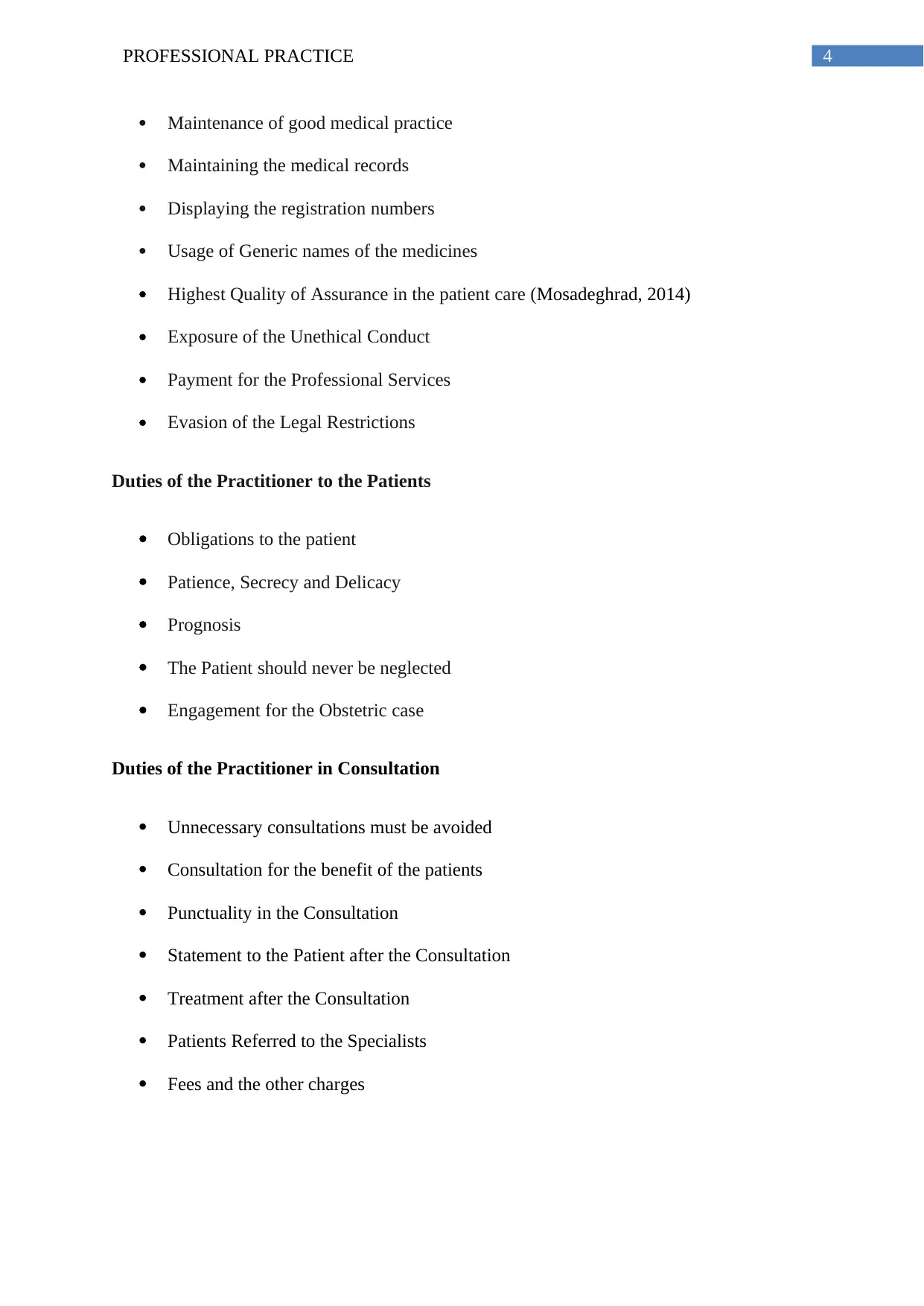
4PROFESSIONAL PRACTICE
Maintenance of good medical practice
Maintaining the medical records
Displaying the registration numbers
Usage of Generic names of the medicines
Highest Quality of Assurance in the patient care (Mosadeghrad, 2014)
Exposure of the Unethical Conduct
Payment for the Professional Services
Evasion of the Legal Restrictions
Duties of the Practitioner to the Patients
Obligations to the patient
Patience, Secrecy and Delicacy
Prognosis
The Patient should never be neglected
Engagement for the Obstetric case
Duties of the Practitioner in Consultation
Unnecessary consultations must be avoided
Consultation for the benefit of the patients
Punctuality in the Consultation
Statement to the Patient after the Consultation
Treatment after the Consultation
Patients Referred to the Specialists
Fees and the other charges
Maintenance of good medical practice
Maintaining the medical records
Displaying the registration numbers
Usage of Generic names of the medicines
Highest Quality of Assurance in the patient care (Mosadeghrad, 2014)
Exposure of the Unethical Conduct
Payment for the Professional Services
Evasion of the Legal Restrictions
Duties of the Practitioner to the Patients
Obligations to the patient
Patience, Secrecy and Delicacy
Prognosis
The Patient should never be neglected
Engagement for the Obstetric case
Duties of the Practitioner in Consultation
Unnecessary consultations must be avoided
Consultation for the benefit of the patients
Punctuality in the Consultation
Statement to the Patient after the Consultation
Treatment after the Consultation
Patients Referred to the Specialists
Fees and the other charges
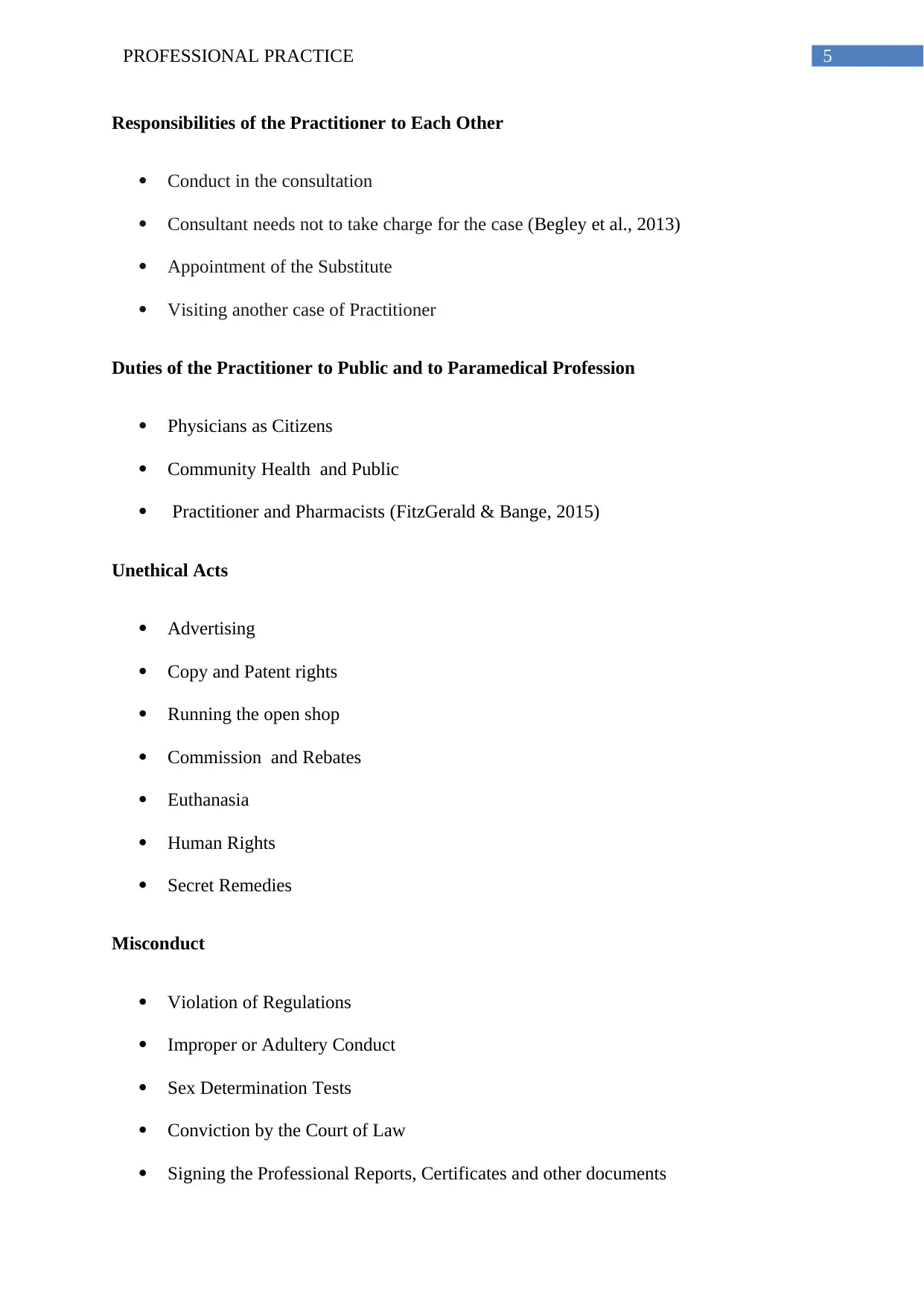
5PROFESSIONAL PRACTICE
Responsibilities of the Practitioner to Each Other
Conduct in the consultation
Consultant needs not to take charge for the case (Begley et al., 2013)
Appointment of the Substitute
Visiting another case of Practitioner
Duties of the Practitioner to Public and to Paramedical Profession
Physicians as Citizens
Community Health and Public
Practitioner and Pharmacists (FitzGerald & Bange, 2015)
Unethical Acts
Advertising
Copy and Patent rights
Running the open shop
Commission and Rebates
Euthanasia
Human Rights
Secret Remedies
Misconduct
Violation of Regulations
Improper or Adultery Conduct
Sex Determination Tests
Conviction by the Court of Law
Signing the Professional Reports, Certificates and other documents
Responsibilities of the Practitioner to Each Other
Conduct in the consultation
Consultant needs not to take charge for the case (Begley et al., 2013)
Appointment of the Substitute
Visiting another case of Practitioner
Duties of the Practitioner to Public and to Paramedical Profession
Physicians as Citizens
Community Health and Public
Practitioner and Pharmacists (FitzGerald & Bange, 2015)
Unethical Acts
Advertising
Copy and Patent rights
Running the open shop
Commission and Rebates
Euthanasia
Human Rights
Secret Remedies
Misconduct
Violation of Regulations
Improper or Adultery Conduct
Sex Determination Tests
Conviction by the Court of Law
Signing the Professional Reports, Certificates and other documents
⊘ This is a preview!⊘
Do you want full access?
Subscribe today to unlock all pages.

Trusted by 1+ million students worldwide
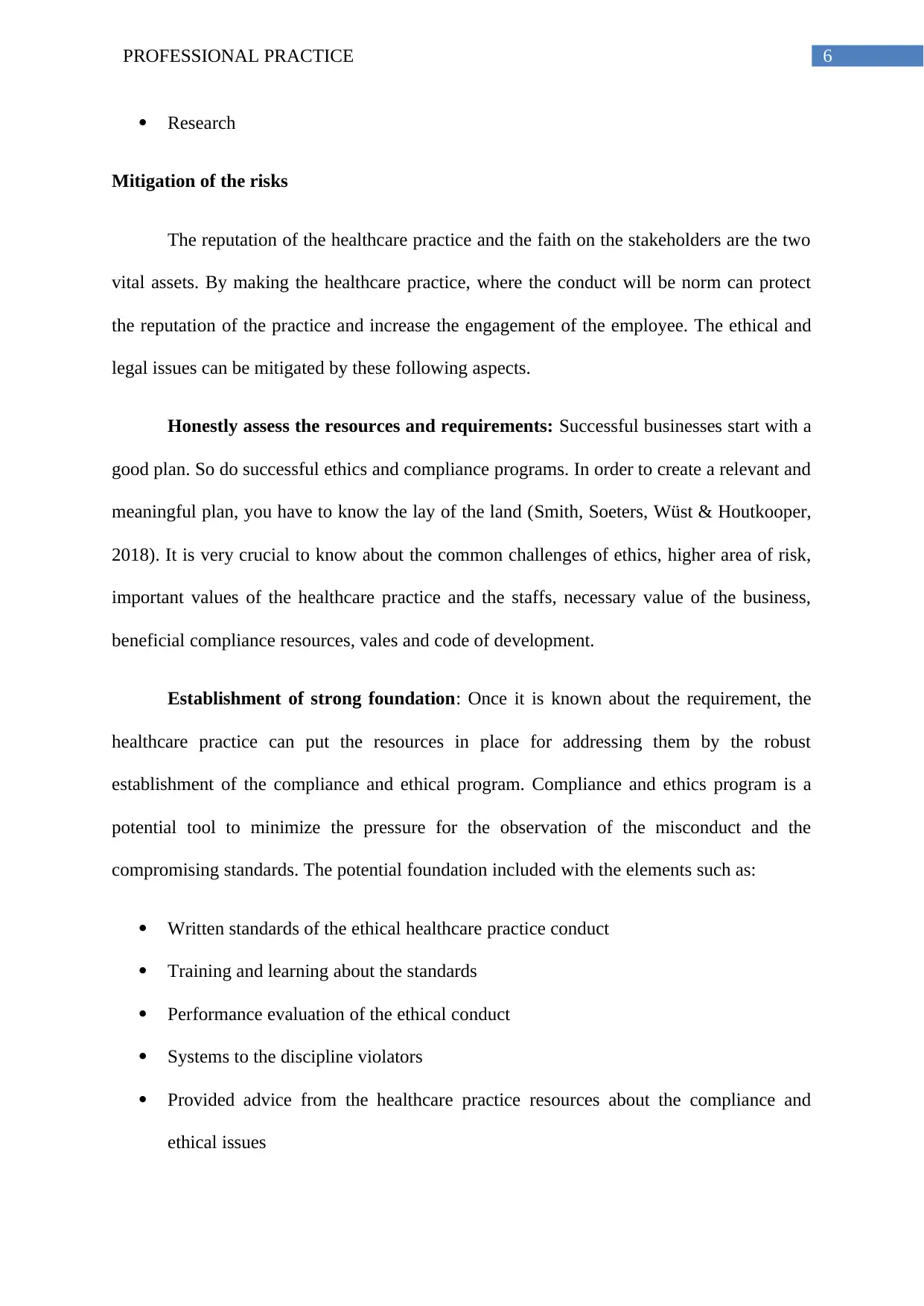
6PROFESSIONAL PRACTICE
Research
Mitigation of the risks
The reputation of the healthcare practice and the faith on the stakeholders are the two
vital assets. By making the healthcare practice, where the conduct will be norm can protect
the reputation of the practice and increase the engagement of the employee. The ethical and
legal issues can be mitigated by these following aspects.
Honestly assess the resources and requirements: Successful businesses start with a
good plan. So do successful ethics and compliance programs. In order to create a relevant and
meaningful plan, you have to know the lay of the land (Smith, Soeters, Wüst & Houtkooper,
2018). It is very crucial to know about the common challenges of ethics, higher area of risk,
important values of the healthcare practice and the staffs, necessary value of the business,
beneficial compliance resources, vales and code of development.
Establishment of strong foundation: Once it is known about the requirement, the
healthcare practice can put the resources in place for addressing them by the robust
establishment of the compliance and ethical program. Compliance and ethics program is a
potential tool to minimize the pressure for the observation of the misconduct and the
compromising standards. The potential foundation included with the elements such as:
Written standards of the ethical healthcare practice conduct
Training and learning about the standards
Performance evaluation of the ethical conduct
Systems to the discipline violators
Provided advice from the healthcare practice resources about the compliance and
ethical issues
Research
Mitigation of the risks
The reputation of the healthcare practice and the faith on the stakeholders are the two
vital assets. By making the healthcare practice, where the conduct will be norm can protect
the reputation of the practice and increase the engagement of the employee. The ethical and
legal issues can be mitigated by these following aspects.
Honestly assess the resources and requirements: Successful businesses start with a
good plan. So do successful ethics and compliance programs. In order to create a relevant and
meaningful plan, you have to know the lay of the land (Smith, Soeters, Wüst & Houtkooper,
2018). It is very crucial to know about the common challenges of ethics, higher area of risk,
important values of the healthcare practice and the staffs, necessary value of the business,
beneficial compliance resources, vales and code of development.
Establishment of strong foundation: Once it is known about the requirement, the
healthcare practice can put the resources in place for addressing them by the robust
establishment of the compliance and ethical program. Compliance and ethics program is a
potential tool to minimize the pressure for the observation of the misconduct and the
compromising standards. The potential foundation included with the elements such as:
Written standards of the ethical healthcare practice conduct
Training and learning about the standards
Performance evaluation of the ethical conduct
Systems to the discipline violators
Provided advice from the healthcare practice resources about the compliance and
ethical issues
Paraphrase This Document
Need a fresh take? Get an instant paraphrase of this document with our AI Paraphraser
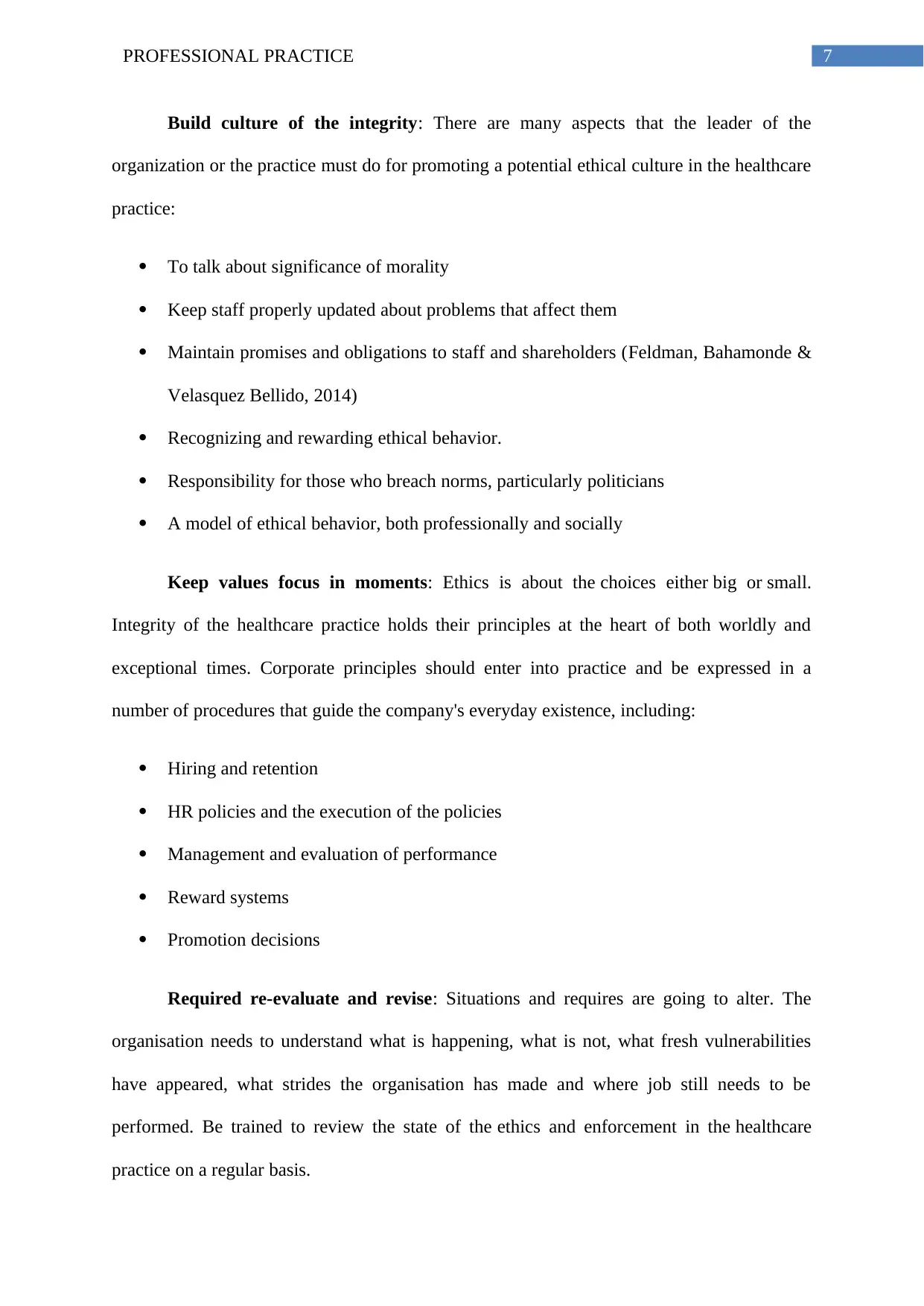
7PROFESSIONAL PRACTICE
Build culture of the integrity: There are many aspects that the leader of the
organization or the practice must do for promoting a potential ethical culture in the healthcare
practice:
To talk about significance of morality
Keep staff properly updated about problems that affect them
Maintain promises and obligations to staff and shareholders (Feldman, Bahamonde &
Velasquez Bellido, 2014)
Recognizing and rewarding ethical behavior.
Responsibility for those who breach norms, particularly politicians
A model of ethical behavior, both professionally and socially
Keep values focus in moments: Ethics is about the choices either big or small.
Integrity of the healthcare practice holds their principles at the heart of both worldly and
exceptional times. Corporate principles should enter into practice and be expressed in a
number of procedures that guide the company's everyday existence, including:
Hiring and retention
HR policies and the execution of the policies
Management and evaluation of performance
Reward systems
Promotion decisions
Required re-evaluate and revise: Situations and requires are going to alter. The
organisation needs to understand what is happening, what is not, what fresh vulnerabilities
have appeared, what strides the organisation has made and where job still needs to be
performed. Be trained to review the state of the ethics and enforcement in the healthcare
practice on a regular basis.
Build culture of the integrity: There are many aspects that the leader of the
organization or the practice must do for promoting a potential ethical culture in the healthcare
practice:
To talk about significance of morality
Keep staff properly updated about problems that affect them
Maintain promises and obligations to staff and shareholders (Feldman, Bahamonde &
Velasquez Bellido, 2014)
Recognizing and rewarding ethical behavior.
Responsibility for those who breach norms, particularly politicians
A model of ethical behavior, both professionally and socially
Keep values focus in moments: Ethics is about the choices either big or small.
Integrity of the healthcare practice holds their principles at the heart of both worldly and
exceptional times. Corporate principles should enter into practice and be expressed in a
number of procedures that guide the company's everyday existence, including:
Hiring and retention
HR policies and the execution of the policies
Management and evaluation of performance
Reward systems
Promotion decisions
Required re-evaluate and revise: Situations and requires are going to alter. The
organisation needs to understand what is happening, what is not, what fresh vulnerabilities
have appeared, what strides the organisation has made and where job still needs to be
performed. Be trained to review the state of the ethics and enforcement in the healthcare
practice on a regular basis.
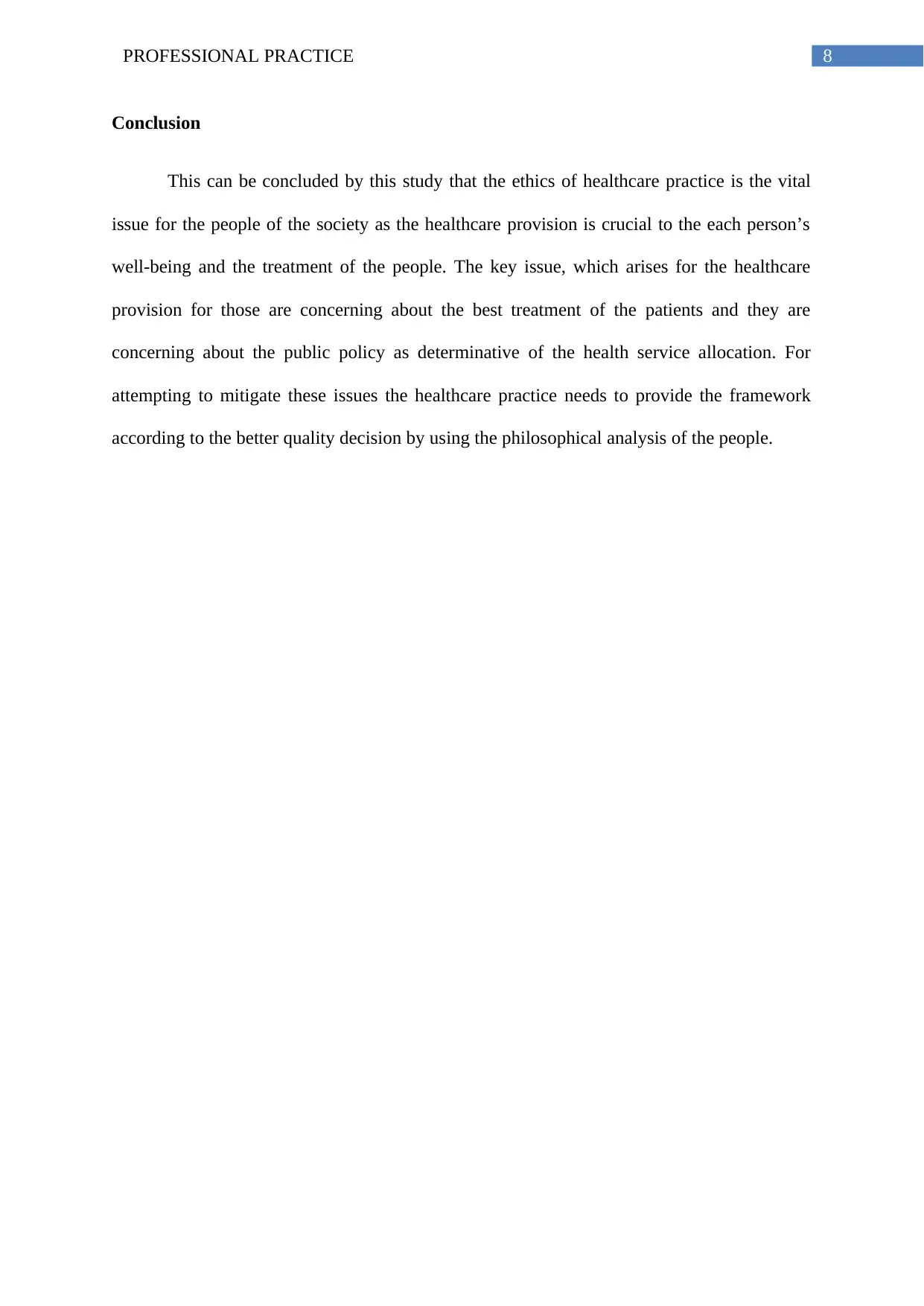
8PROFESSIONAL PRACTICE
Conclusion
This can be concluded by this study that the ethics of healthcare practice is the vital
issue for the people of the society as the healthcare provision is crucial to the each person’s
well-being and the treatment of the people. The key issue, which arises for the healthcare
provision for those are concerning about the best treatment of the patients and they are
concerning about the public policy as determinative of the health service allocation. For
attempting to mitigate these issues the healthcare practice needs to provide the framework
according to the better quality decision by using the philosophical analysis of the people.
Conclusion
This can be concluded by this study that the ethics of healthcare practice is the vital
issue for the people of the society as the healthcare provision is crucial to the each person’s
well-being and the treatment of the people. The key issue, which arises for the healthcare
provision for those are concerning about the best treatment of the patients and they are
concerning about the public policy as determinative of the health service allocation. For
attempting to mitigate these issues the healthcare practice needs to provide the framework
according to the better quality decision by using the philosophical analysis of the people.
⊘ This is a preview!⊘
Do you want full access?
Subscribe today to unlock all pages.

Trusted by 1+ million students worldwide
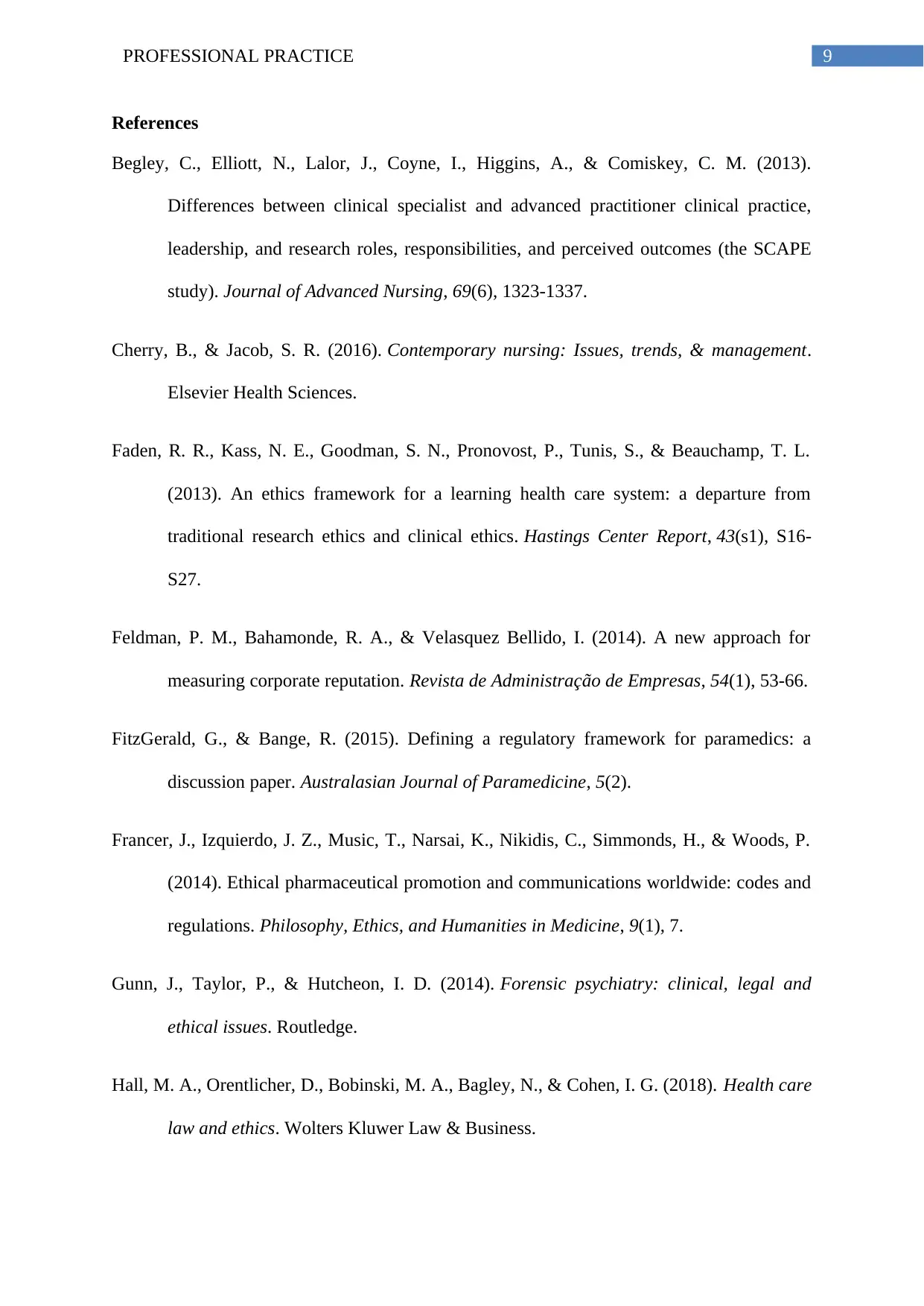
9PROFESSIONAL PRACTICE
References
Begley, C., Elliott, N., Lalor, J., Coyne, I., Higgins, A., & Comiskey, C. M. (2013).
Differences between clinical specialist and advanced practitioner clinical practice,
leadership, and research roles, responsibilities, and perceived outcomes (the SCAPE
study). Journal of Advanced Nursing, 69(6), 1323-1337.
Cherry, B., & Jacob, S. R. (2016). Contemporary nursing: Issues, trends, & management.
Elsevier Health Sciences.
Faden, R. R., Kass, N. E., Goodman, S. N., Pronovost, P., Tunis, S., & Beauchamp, T. L.
(2013). An ethics framework for a learning health care system: a departure from
traditional research ethics and clinical ethics. Hastings Center Report, 43(s1), S16-
S27.
Feldman, P. M., Bahamonde, R. A., & Velasquez Bellido, I. (2014). A new approach for
measuring corporate reputation. Revista de Administração de Empresas, 54(1), 53-66.
FitzGerald, G., & Bange, R. (2015). Defining a regulatory framework for paramedics: a
discussion paper. Australasian Journal of Paramedicine, 5(2).
Francer, J., Izquierdo, J. Z., Music, T., Narsai, K., Nikidis, C., Simmonds, H., & Woods, P.
(2014). Ethical pharmaceutical promotion and communications worldwide: codes and
regulations. Philosophy, Ethics, and Humanities in Medicine, 9(1), 7.
Gunn, J., Taylor, P., & Hutcheon, I. D. (2014). Forensic psychiatry: clinical, legal and
ethical issues. Routledge.
Hall, M. A., Orentlicher, D., Bobinski, M. A., Bagley, N., & Cohen, I. G. (2018). Health care
law and ethics. Wolters Kluwer Law & Business.
References
Begley, C., Elliott, N., Lalor, J., Coyne, I., Higgins, A., & Comiskey, C. M. (2013).
Differences between clinical specialist and advanced practitioner clinical practice,
leadership, and research roles, responsibilities, and perceived outcomes (the SCAPE
study). Journal of Advanced Nursing, 69(6), 1323-1337.
Cherry, B., & Jacob, S. R. (2016). Contemporary nursing: Issues, trends, & management.
Elsevier Health Sciences.
Faden, R. R., Kass, N. E., Goodman, S. N., Pronovost, P., Tunis, S., & Beauchamp, T. L.
(2013). An ethics framework for a learning health care system: a departure from
traditional research ethics and clinical ethics. Hastings Center Report, 43(s1), S16-
S27.
Feldman, P. M., Bahamonde, R. A., & Velasquez Bellido, I. (2014). A new approach for
measuring corporate reputation. Revista de Administração de Empresas, 54(1), 53-66.
FitzGerald, G., & Bange, R. (2015). Defining a regulatory framework for paramedics: a
discussion paper. Australasian Journal of Paramedicine, 5(2).
Francer, J., Izquierdo, J. Z., Music, T., Narsai, K., Nikidis, C., Simmonds, H., & Woods, P.
(2014). Ethical pharmaceutical promotion and communications worldwide: codes and
regulations. Philosophy, Ethics, and Humanities in Medicine, 9(1), 7.
Gunn, J., Taylor, P., & Hutcheon, I. D. (2014). Forensic psychiatry: clinical, legal and
ethical issues. Routledge.
Hall, M. A., Orentlicher, D., Bobinski, M. A., Bagley, N., & Cohen, I. G. (2018). Health care
law and ethics. Wolters Kluwer Law & Business.
Paraphrase This Document
Need a fresh take? Get an instant paraphrase of this document with our AI Paraphraser
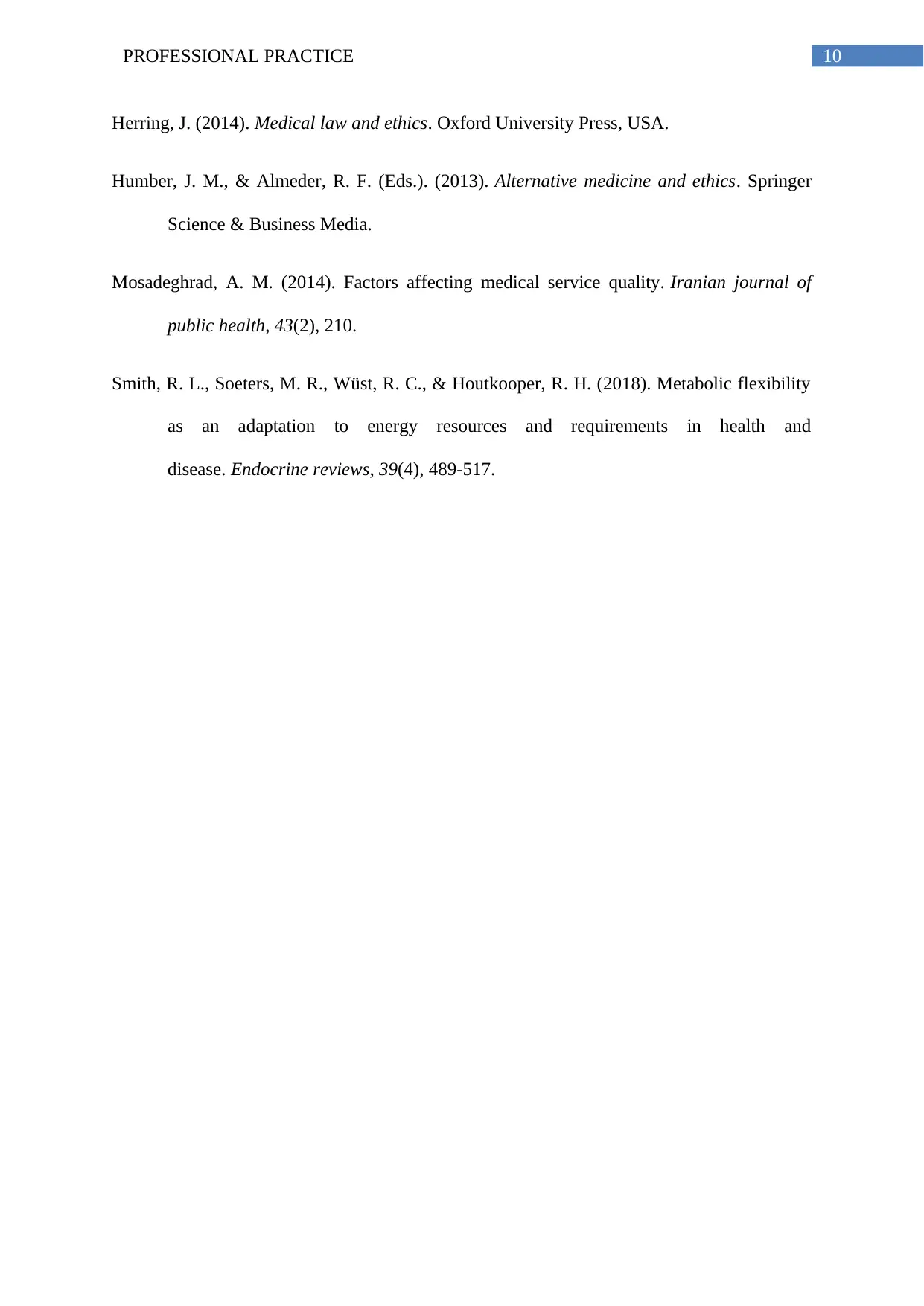
10PROFESSIONAL PRACTICE
Herring, J. (2014). Medical law and ethics. Oxford University Press, USA.
Humber, J. M., & Almeder, R. F. (Eds.). (2013). Alternative medicine and ethics. Springer
Science & Business Media.
Mosadeghrad, A. M. (2014). Factors affecting medical service quality. Iranian journal of
public health, 43(2), 210.
Smith, R. L., Soeters, M. R., Wüst, R. C., & Houtkooper, R. H. (2018). Metabolic flexibility
as an adaptation to energy resources and requirements in health and
disease. Endocrine reviews, 39(4), 489-517.
Herring, J. (2014). Medical law and ethics. Oxford University Press, USA.
Humber, J. M., & Almeder, R. F. (Eds.). (2013). Alternative medicine and ethics. Springer
Science & Business Media.
Mosadeghrad, A. M. (2014). Factors affecting medical service quality. Iranian journal of
public health, 43(2), 210.
Smith, R. L., Soeters, M. R., Wüst, R. C., & Houtkooper, R. H. (2018). Metabolic flexibility
as an adaptation to energy resources and requirements in health and
disease. Endocrine reviews, 39(4), 489-517.
1 out of 11
Related Documents
Your All-in-One AI-Powered Toolkit for Academic Success.
+13062052269
info@desklib.com
Available 24*7 on WhatsApp / Email
![[object Object]](/_next/static/media/star-bottom.7253800d.svg)
Unlock your academic potential
Copyright © 2020–2026 A2Z Services. All Rights Reserved. Developed and managed by ZUCOL.





